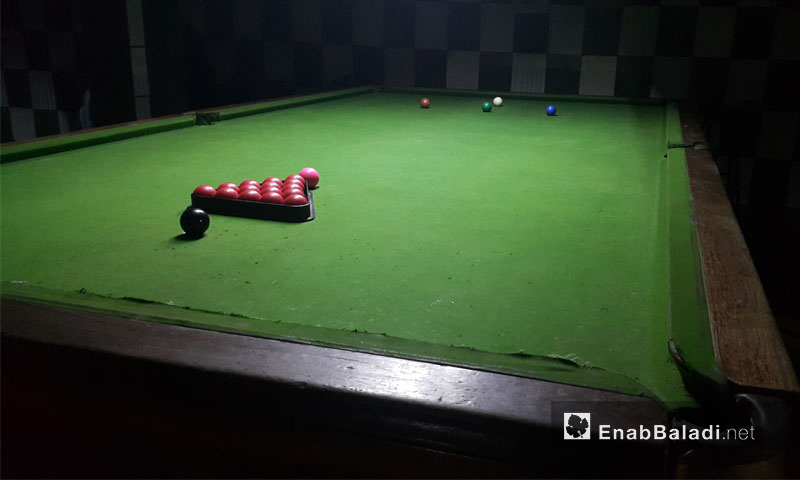



Enab Baladi – Idlib
Inside one of the cafes in Idlib city, to the tune of the soft bubbling of nargilehs (hookah) and the sound of dice being thrown on a backgammon board, Abu Abdu, a man in his fifties, managed to interrupt his game with great difficulty to speak to us about his almost daily evening visits to the café.
“I am now fifty years old and life has become boring. This prompted me to become a daily visitor to the café to play backgammon with my friends,” said Abu Abdu while throwing the dice, shouting, “Shesh Besh!” as they landed.
Conversations in the cafés of Idlib city vary – some café-goers speak about the social and political situation while others find there the pleasure of “forgetting their worries.” A man in his fifties said, “Lighten your burden, have a cup of tea. We are all going to die. Look, we have aged and we can no longer work, our time is over and now it is our children’s time.”
Abu Abdu is representative of many of the older residents of Idlib city who spend most of their time sitting and chatting with their friends. Cafes “are the perfect place to enjoy this type of atmosphere.”
Mohammed Saeed owns one of the few cafes still open in Idlib city. He said, “The café is central to any residential area.” He indicated that the traditional café that used to be filled with young people, local men from the neighborhood and the local storyteller “no longer exists because its original clientele are no longer there. Life has changed. Today the clientele is limited to senior citizens who see it as a nice memory from their youthful days.”
Cafes and increasingly games centers, also known here as “cafeterias”, are found all over Idlib city. Cafeterias have many different activities that attract young people, from TV screens showing sports matches to a variety of games including billiards, ping pong and table football.
Mohsen Battish, a young man from Idlib city, frequents one of the games centers on a regular basis, and says about cafes, “They are no longer popular, life has changed.” Games centers and fitness gyms are the replacement, “In our neighborhood there is a hall where dozens of young people gather every day to play and hang out.”
According to those Enab Baladi spoke to, table football is considered the most appealing activity for young men due to “the enjoyment of playing and developing skills”, according to Battish. He explained that real tournaments are held between the young men and participants give descriptions to players such as quick-witted and devious. Billiards and ping pong require high precision, calm and skill as they are games that require a lot of movement and effort.
Many young people fear the rise of the Sharia Commissions and Islamic factions that consider these games a waste of time. Fear of these groups has led nargilehs to disappear from many places and some games to be restricted to being played only at home.
Card games have not disappeared from Idlib city but are merely restricted to being played in the privacy of the home. Karam Houri, a displaced young man from Homs city, attributed this to “the problems (card games) involve such as shouting and betting, which may at times lead players to curse and blaspheme.”
Houri indicated that the game is considered “haram” but that young people play it with specific rules so they do not harm anyone, far from cafes and games centers to avoid problems.
According to the residents of Idlib city, the cafes were previously very busy at night but activity has decreased due to regime and Russian air bombardment of the area.
Jawad al-Hamawi, a resident of Idlib city who was displaced from the city of Hama, considers that those who go to cafés “are only those who live close by” while others see that frequenting cafes might attract questions from the commissions responsible for the city, which belong to Jaish al-Fatah.
Although young Syrians used to frequent cafes before 2011, they are no longer desirable destinations in the areas under opposition control. While areas under regime control have witnessed an increase in the number of cafes and restaurants opening, few entrepreneurs in “liberated” regions dare to invest in areas torn apart by war.
if you think the article contain wrong information or you have additional details Send Correction